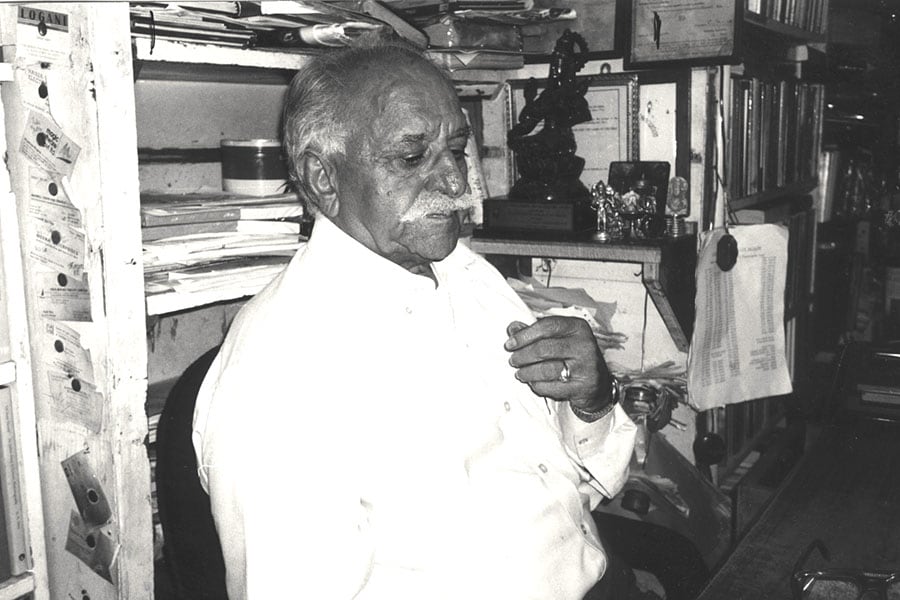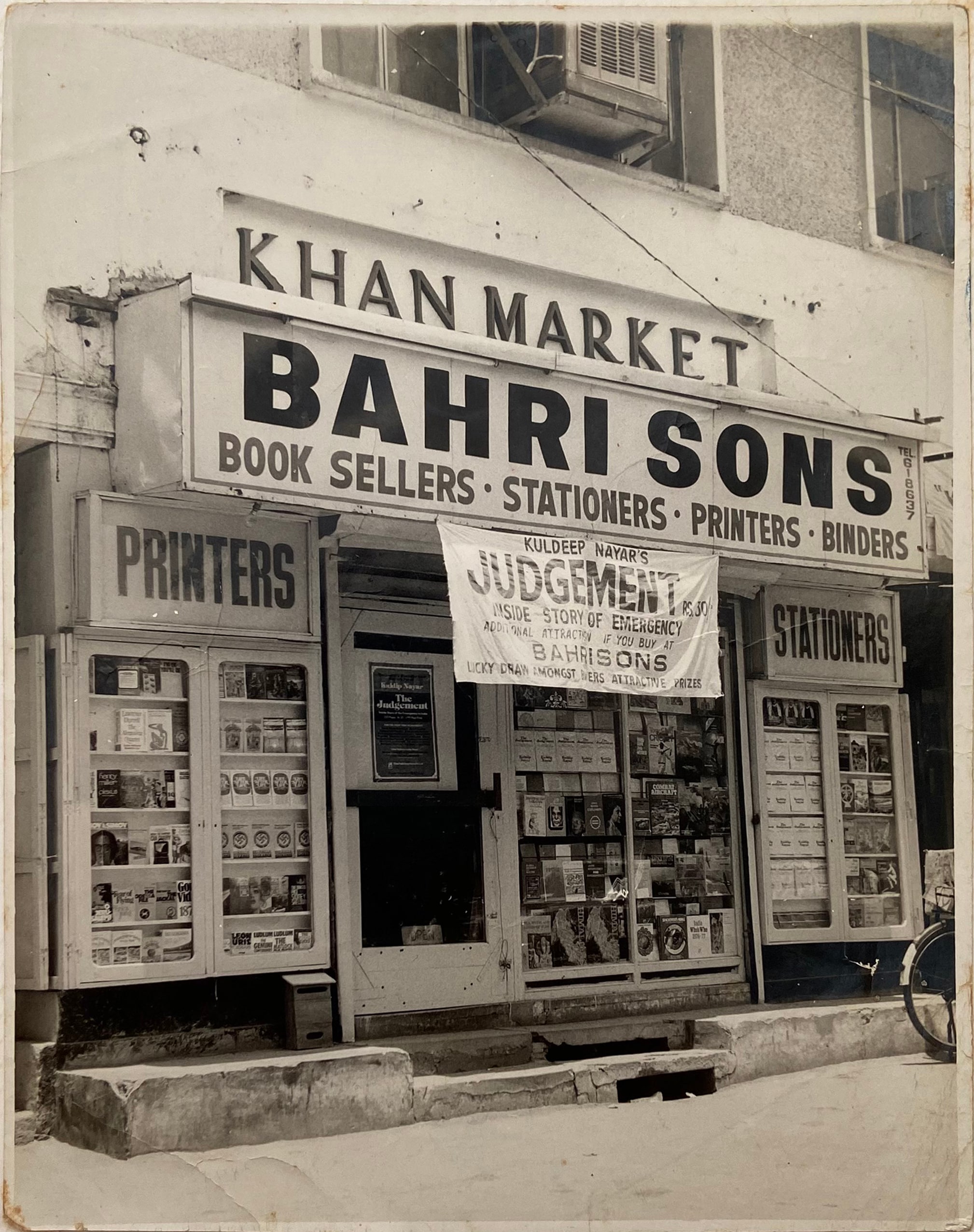Delhi's iconic Bahrisons is expanding its footprint in the business of books
The family-run business, which turns 70 in October, remains bootstrapped as it expands to more cities and revives its publishing vertical


Anuj Bahri Malhotra does not believe in ending anything abruptly, be it business or tradition. In his case, one blends into the other.
The second-generation entrepreneur is sitting on a chair on the first floor of the iconic Bahrisons bookstore in Delhi’s Khan Market, which is also his office space. The store was founded and started by his father Balraj Bahri in 1953, and Malhotra has now run it for 44 years.
He was 16 years old when he started coming to the store regularly in 1979. But unlike his father, who believed that the owner should sit on the cash counter, Malhotra was a restless soul. He wanted to do more, and expand their presence to different facets of the book business. This led him to start a publishing house and a literary agency, even as he remained connected to the family’s legacy bookstore business.
Today, as the Bahrisons Booksellers in Delhi’s Khan Market turns 70 in October, there are already five more outlets in Delhi, and one each in Gurugram, Noida, Chandigarh and Kolkata. The second outlet in Kolkata will be open in 2024, and Malhotra is also considering prospects of opening stores in other cities, provided “it is profitable", he says. “We’ll give these stores another year before planning the next one, because a business should be profitable. If I do not make money, what am I expanding for?" he says.
Each store—given the collection that he has to stock in order to cater to Bahrisons’s elite clientele of academics, diplomats, journalists, authors, foreigners, and other individuals and families of note—costs at least Rs 1.5 crore to set up, and about six months to break even and become profitable, claims Malhotra, not sharing numbers.
In keeping with tradition, the business is bootstrapped, with Malhotra relying on bank loans for locations where he has to buy real estate for the store instead of renting it. He is also focussing on his literary agency, Red Ink, which has represented and helped publish works of authors like Amish Tripathi, Anuja Chauhan, Shrabani Basu and Shauna Singh Baldwin.
On top of his priority list is also reviving his publishing house Tara-India Research Press. He had started it in 2002 with a focus on publishing books related to academia and social sciences, and later branched out to include narrative non-fiction and fiction. It had published close to 550 titles before it shuttered in the wake of the Covid-19 pandemic, Malhotra says.
Now, with a team to handle editorial and marketing, there’s a new frontlist, and a goal to publish “12 to 15 titles a year", the first of which will be out next year. Malhotra says he wants to revive Tara because he can’t let it die a slow death. A businessman needs to fight for the survival and continuity of what their venture, he believes.
He seems to be largely unconcerned with the fear around the future of bookstores in the digital age. “Youngsters these days ask me who reads books. We get about 500-600 clients in our store every day, so there must be people who are reading them," he says.
The longevity that Bahrisons has enjoyed and the fact that it is expanding is a positive sight “in this day and age of Amazon, which is killing independent bookstores", says author Akshaya Mukul, who has been a long-time customer of Bahrisons. “The sheer joy of browsing through books can never be replaced by online surfing. You meet interesting people, come across new book recommendations, only by hanging out in a bookstore," says Mukul, who has written Gita Press and the Making of Hindu India, and the biography of the iconic Hindi writer Agyeya. “With Bahrisons, Mr [Balraj] Bahri created a culture of independent bookstores that Anuj has carried forward."
 Balraj Bahri at the bookstore
Balraj Bahri at the bookstore
Selling books was not Balraj Bahri’s first vocation, but one that he stumbled upon by chance. He belonged to an affluent family of landowners from Mandi Bahauddin, which is today in Pakistan. He settled in Delhi after the Partition in 1947, and lived in a refugee camp called Kingsway, where he met the woman he would fall in love with and marry. He did a few odd-jobs like selling pens in Chandni Chowk and tickets to train berths in the Rajdhani Express. He also briefly taught in a school. “But he was a hot-headed man, did not get along well with the faculty," Malhotra says.
Then, Prem Sagar, a friend whose family owns the Lakshmi Book Store in Janpath, suggested Bahri get into the business of books. “My dad had no idea about books, but he liked the idea of running a bookstore because he said it was a clean business, a business of the educated," Malhotra recalls. “There is not much money in it, but there is a lot of respect." His father bought the shop in Khan Market by selling a gold bangle of his mother, promising to pay her back. “He lived up to the promise," Malhotra says. Later, two more stores were added and made into the one store that stands today.
 Bahrisons, which started in Khan Market in 1953, has now expanded to other locations in Delhi, apart from Gurugram, Noida, Chandigarh and Kolkata
Bahrisons, which started in Khan Market in 1953, has now expanded to other locations in Delhi, apart from Gurugram, Noida, Chandigarh and Kolkata
Malhotra, who is the youngest of three siblings, says that his father worked hard to ensure his family never feels the pinch of money. “His work culture has been inculcated in this whole family," says Malhotra, whose wife Rajni runs Bahrisons with him. Their daughter Aanchal is an author.
Malhotra, on the other hand, remains old-school and prefers face-to-face communication. This has helped him build strong connections in the trade. “He has his eyes and ears everywhere. He knows exactly what is going on," says Ashwin Sanghi, author of books like The Krishna Key and Chanakya’s Chant, who is represented by Red Ink. “Anuj is successful because he is genuinely passionate, and curious about what you are up to. Over the years, even when I was not represented by him, we would meet up frequently, and the meetings would be completely without an agenda."
The staff members are also trained to forge a connection with customers. Many people remember Mithilesh Singh, who is among the seniormost employees at Bahrisons. He has catered to clientele including businessman Ratan Tata, politician-lawyer Kapil Sibal and historian William Dalrymple. Mithilesh is known to even procure books that are out-of-print, Mukul says. “When I was working on the Gita Press book and asked for a particular book that was out of print, Mithilesh remembered someone who had bought the book ten years ago. He contacted them, borrowed the book for a day, got it photocopied and gave it to me. Even I have lent him so many books to be photocopied for others," the author says.
Mithilesh, who joined the bookstore in 1996, has been responsible for training staff members who run the store in other locations. When he joined, they had to remember every book they stocked in the store, he says. Even now, when books are logged into the system, he encourages people to commit each of them to memory. “I train new staff members by spending a lot of time when them on the shop floor and sharing my experience, so that when they go to manage a store on their own, they take the same tradition forward" Mithilesh says.
Singh, who has been a customer for 60 years and usually deals with Mithilesh, says that there is a lot of connection and conversation at the store beyond just buying books. “There is a personalised service and commitment to the business of reading. People working there are genuinely committed to selling books and are not in it for a mere sale," she says.
Bahrisons is one of those rare bookstores that lets him buy books on credit and pay in installments, Mukul says, adding that the staff has also been given the autonomy to take decisions on many day-to-day operations. “They can decide how much discount to give someone, for example. They need not check with Anuj for everything," he says.
Staff members are trained to become ambassadors of the store, Rajni says, adding that they play a role in not just connecting with existing customers, but also spreading the word about new stores. No matter how much the business expands, or changes, thanks to the digital age and shifting readership, she wants some of these practices to remain the same. “People say Bahrisons is a brand, but for me, it will always remain a small family business."
First Published: Oct 11, 2023, 15:36
Subscribe Now